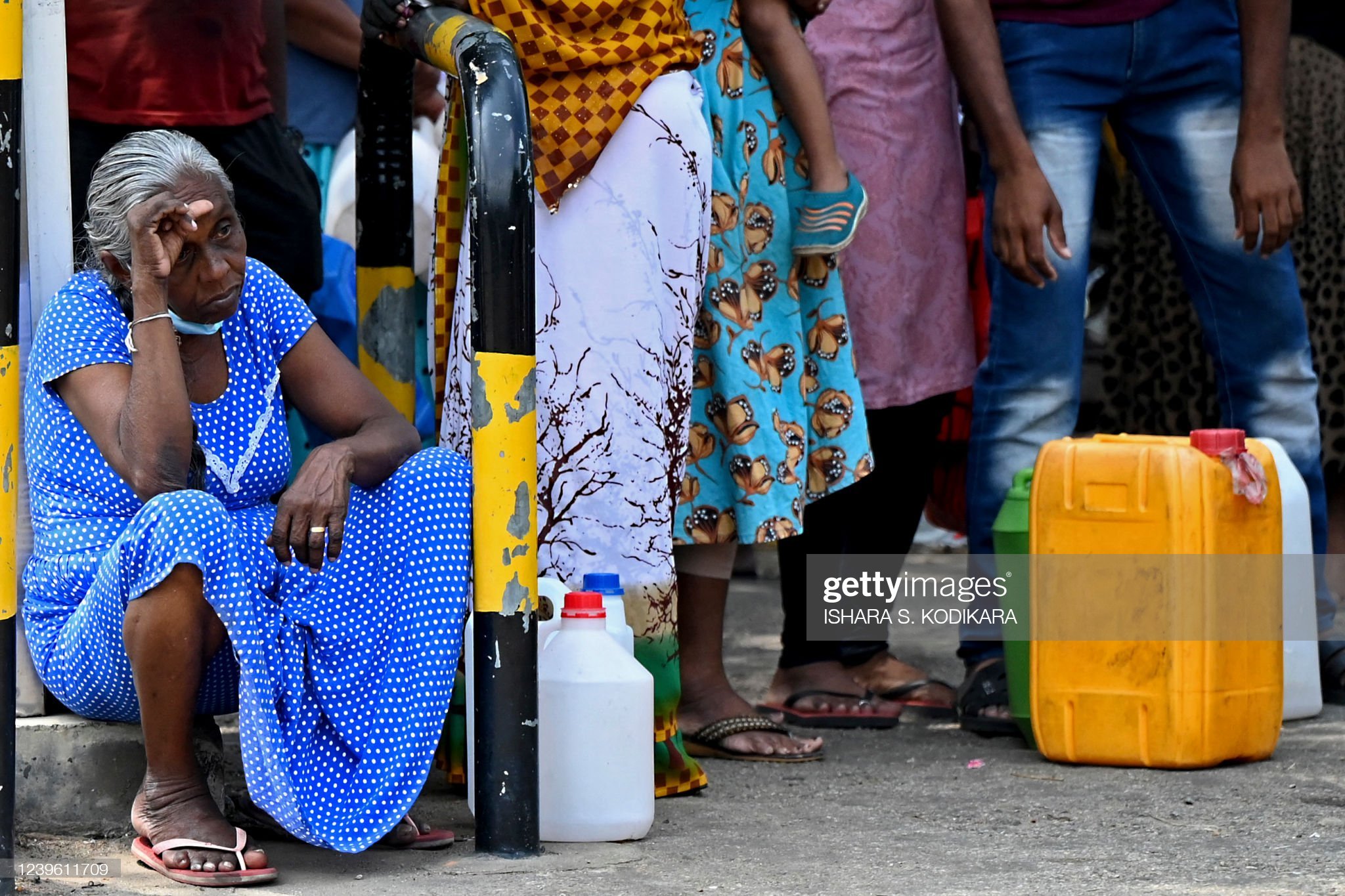Analysis: Sri Lanka’s Economic Crisis
A woman waits in a queue to buy kerosene for home use at a service station in Colombo
Photo: Getty Images
Sri Lanka is Suffering from An Acute Economic Crisis
While Europe is in the midst of an energy crisis mainly due to less reliance on Russia’s Natural Gas imports, this South Asian country has suffered from a severe energy shortage for months. Vehicles in Sri Lanka have been lining up for petrol and diesel. According to the Central Bank of Sri Lanka’s reports, rice price soared by around 80% comparing with last year. 1.7 million people need life-saving assistance. Students cannot go to school and exams are postponed due to the lack of paper and ink. This island nation “has never faced such a severe economic crisis in its history”, said the spokesperson for the Sri Lankan cabinet Bandula Gunawardana. Government officials are seeking help from foreign nations and international organizations. However, this disaster cannot be solved in a short period.
Multiple Crises and Unrest
Due to chronic shortages, many Sri Lankans are waiting in line to buy petrol and diesel. The high inflation in fuel prices brings more burdens to the public. Furthermore, Sri Lanka has halted sales of fuel for non-essential vehicles. In the upcoming weeks, only buses, trains, and cars used for medical services and food transportation can be allowed to obtain gas.
Besides the energy crisis, Sri Lanka is also struggling with a food shortage. Because of limited foreign currency reserves, the Sri Lankan government restricted imports of chemical fertilizers and promoted a fully organic farming style. However, it caused even fewer crop yields, which deteriorates both food and its foreign reserve situations.
Without adequate energy and food, students cannot go to school, people are working from home. For people who are relying on vehicles to work, if they cannot get petrol, they cannot receive salaries either, which has contributed to increased economic pressures on low-income families. Moreover, waves of protests have gripped the country.
Main Reason for Sri Lanka’s Economic Crisis
What caused the crisis in Sri Lanka? Covid-19 interrupted travelers to the tourism-reliant country. The Russia-Ukraine war can affect Oil prices. Despite these two factors, many critics point to economic mismanagement by successive governments.
Sri Lanka ended its 26-year-long civil war in 2009. The then-president Mahinda Rajapaksa, who is also the brother of Sri Lanka’s current president, received many international loans to fund infrastructure projects to rejuvenate the country’s overall development. However, the controversial tax cut in 2019 led to revenue losses of more than $1.4 bn a year. additionally, the limitation on chemical fertilizer imports threatened the agricultural part of the country. Furthermore, critics of the appointment of key government officials, who are the president’s relatives, spurred resentment among the public. Due to the tax cut policy, low crop yields, as well as political unsettlement, and heavy reliance on imports, Sri Lanka’s ability to pay back loans has been seriously weakened.
What Actions Have Been Taken?
Under the current situation, the Sri Lankan government attempts to seek help from outside. Sri Lanka has a total of $51bn in foreign debt and will be required to pay $7bn to service these debts. World Bank has agreed to provide $600 million to Sri Lanka. Despite the effort to look for a bailout plan from the International Monetary Fund (IMF), Sri Lanka failed to come up with a bailout package. Nation-states are also Sri Lanka’s targets. G7 member states have committed to providing debt relief. China will offer “hundred million dollars” for good shortage alleviation. India committed $1.9 bn with the potential of sending $1.5 bn more. Power and Energy Minister Kanchana Wijesekera met with Qatar to attain secure energy. Another group of Sri Lankan officials will go to Russia to search for energy plans.
What Should be Next
Currently, major opinions and news coverage are directed at the energy crisis in the EU. Developing countries like Sri Lanka face similarly challenging circumstances but draw less attention. For a domestic crisis, the impoverished groups suffer; for a global catastrophe, the under-developed countries suffer. The world should work together to find a solution.
In the short term, observers note that nation-states and international organizations should provide appropriate and on-time assistance to Sri Lanka, such as debt relief, loans, and necessary goods for the public. The United Nations team in Sri Lanka has called for $47.2 million to provide assistance. In the long term, on the other hand, Sri Lanka’s government should modify its current economic policies and administration to provide a stable and livable environment for 22 million citizens; and move towards a more rapid-response and effective government to prepare for any potential public crises.
References
https://www.cbsl.gov.lk/sites/default/files/cbslweb_documents/statistics/pricerpt/price_report_20220701.pdf
https://www.cbsl.gov.lk/sites/default/files/cbslweb_documents/statistics/pricerpt/price_report_20210701e.pdf
https://srilanka.un.org/en/185454-un-calls-over-us47-million-life-saving-assistance-17-million-people
https://www.aljazeera.com/news/2022/3/29/sri-lanka-economic-crisis-moonlight-prices-soar
https://www.ft.com/content/7b166a66-ce36-41c2-b799-fcaa32e5f3a6
https://www.reuters.com/world/asia-pacific/sri-lanka-eyes-trimming-presidential-powers-amid-unrest-over-economic-crisis-2022-06-30/
https://www.bbc.com/news/world-61028138
https://www.cnbc.com/2022/06/30/imf-sri-lanka-bailout-talks-end-without-a-deal.html
https://www.ft.com/content/74323427-0d12-4978-a57d-41a8b7339bd2
https://www.bbc.com/news/world-61028138
https://amp.cnn.com/cnn/2022/06/29/asia/sri-lanka-fuel-shortage-impossible-situation-intl-hnk/index.html
https://amp.cnn.com/cnn/2022/06/29/asia/sri-lanka-fuel-shortage-impossible-situation-intl-hnk/index.html
EDITOR’S NOTE: TBG provides global solutions to the developing world. We leverage a Global Network comprised of more than 1000 experts in over 150 countries. Through TBG Consulting, TBG Global Advisors, TBG Purpose, and TBG Capital, we undertake global projects — from Kenya to Kazakhstan — and transform challenges into opportunities.

